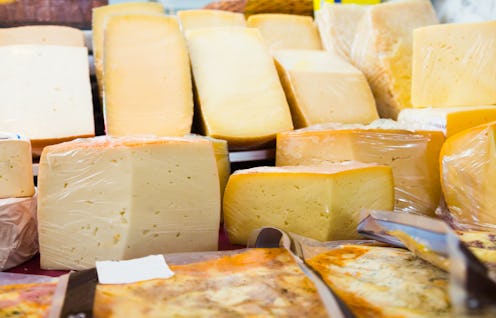Life
The One Thing You Need To Know About Cheese

You already know that milk spoils after a certain amount of time, and that you can only plan to indulge in those leftovers for so long before they start to smell a little funky. But, what about cheese — can cheese get moldy?
I live in Wisconsin, where cheese is essentially the entire bottom portion of our food pyramid. So, it's important that I know how long I can use that sharp cheddar or Colby Jack that's sitting in my fridge before it's physically putting me at risk. After all, I love cheese, but not enough to potentially get sick because of it.
Whether or not cheese can actually get moldy can be a little confusing. With a word liked "aged" used to describe some cheeses, you'd assume there's no such thing as cheese that's too old. And, mold is even used to make some different cheeses, like Brie. So, if cheese can in fact get moldy, is that mold even bad for you? Or, is it something that looks gross, but can basically be ignored?
Well, it turns out that cheese really does get moldy — something that I can attest to, given I've thrown out plenty of slices with a little bit of mold on them. However, the specific type of cheese has a big impact on what exactly you should do upon discovering that moldy mess in your refrigerator.
What types of cheese should you throw out immediately?
If you have soft cheeses in your refrigerator, like cream cheese, ricotta, and cottage cheese, that have evidence of mold, you should toss them immediately. Don't even bother trying to salvage them, as mold can send bacteria threads through these soft cheeses. Additionally, you don't want to take a chance with any harmful bacteria like salmonella or E. coli.
Unfortunately, it's the same story for any cheese that's shredded, crumbled, or already sliced. If there's mold, just toss it.
Is there any moldy cheese you can keep?
Surprisingly, yes, there is. Mold can't penetrate far into harder cheeses. So, that block of cheddar could still be safe — even if there's a spot of mold on it. Simply cut away an inch around the moldy spot, ensuring that the knife doesn't touch any of the mold. After the moldy spot is removed, the cheese should be safe to eat.
How long does it take for cheese to get moldy?
As you might suspect, there's really no cut and dried answer to this. It all depends on things like the type of cheese, moisture, temperature, whether or not it's sealed, etc. Unopened hard and semi-hard cheeses can last for up to two months in the fridge without going bad, and between six and eight months in the freezer. Anything past that, though, probably shouldn't be eaten.
There you have it, everybody. Cheese really can get moldy. But, just because you see a little spot of green on your beloved cheese doesn't mean it needs to be tossed immediately into the trash. Keep this information in mind, and give your cheese the life it deserves. You owe it at least that much.